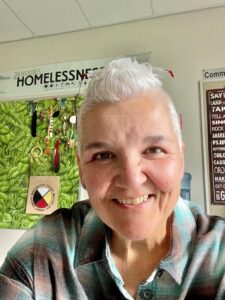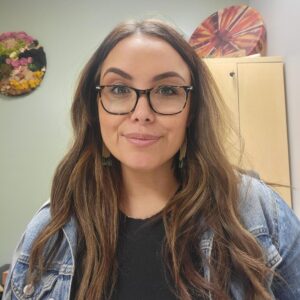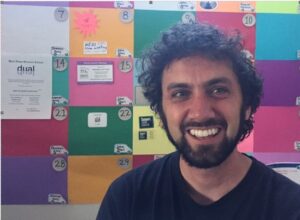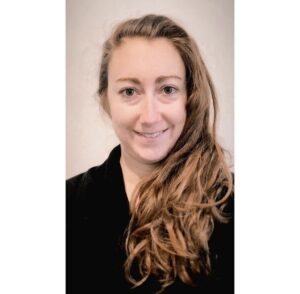Community and Justice Services
Choose a career that teaches you to fight for social justice!
- Program is taught by professors who are actively involved in the field
- Professional development included in the program
- Students complete a twelve-week block placement in a community and/or justice service agency during the last semester in the program
Program Availability and Schedule
Availability
Open
Closed
Waitlisted
Start Term
Availability
International
Availability
Competitive?
Fall 2025
No
Schedule
Data is currently unavailable for this program. Please take a moment to report this via our Website Feedback Form. Thank you!
Program Summary
Credential
Program Delivery
Program Code
Area of Interest
School
Campus
Other Delivery Options
Work Integrated Learning
Eligible for Post-Graduation
Work Permit?
The two-year Community and Justice Services Ontario College Diploma program emphasizes alternatives to policing and prisons and teaches students skills to work with people and communities to address issues such as criminalization, poverty, affordable housing scarcity, food insecurity, and immigration. Through theory and practical experiences, the program teaches you to work with people and communities in ways that respect their inherent dignity and humanity. Learn to understand the historical, political, and economic forces that create these social justice issues.
In this program, you develop skills such as a critical analysis, advocacy, community organizing, group facilitation, conflict mediation, and individual support work with adults, youth, and children. You learn the importance of addressing issues not just on an individual level, but also at a community-based level. Woven throughout the program is a commitment to human rights, social justice, and alternatives to policing and prisons. Study topics include:...(read more)
Overview
Choose a career that teaches you to fight for social justice!
The two-year Community and Justice Services Ontario College Diploma program emphasizes alternatives to policing and prisons and teaches students skills to work with people and communities to address issues such as criminalization, poverty, affordable housing scarcity, food insecurity, and immigration. Through theory and practical experiences, the program teaches you to work with people and communities in ways that respect their inherent dignity and humanity. Learn to understand the historical, political, and economic forces that create these social justice issues.
In this program, you develop skills such as a critical analysis, advocacy, community organizing, group facilitation, conflict mediation, and individual support work with adults, youth, and children. You learn the importance of addressing issues not just on an individual level, but also at a community-based level. Woven throughout the program is a commitment to human rights, social justice, and alternatives to policing and prisons. Study topics include:
- Indigenous studies
- anti-racism/anti-oppression
- gender and sexuality studies
- disability justice
- trauma informed practice
- addiction and harm reduction
- mental health
- community building practices
As a student, you participate in a field placement experience in the community and justice field. In this placement, you identify, practise and integrate skills and theory that you have learned in the program.
SUCCESS FACTORS
This program is well-suited for students who:
- Have an interest in social justice and working towards change in their community.
- Have a commitment to anti-racism.
- Have a strong sense of empathy for others.
- Are collaborative and comfortable working andlearning in group environments.
- Can work independently.
Courses
Programs at Algonquin College are delivered using a variety of instruction modes. Courses may be offered in the classroom or lab, entirely online, or in a hybrid mode which combines classroom sessions with virtual learning activities. Upon registration, each full-time student is provided an Algonquin email account which is used to communicate important information about program or course events.
Code:
COR1834
Course Name:
Canadian Legal System 1
Course Description:
In order to support clients, it is necessary to understand the systems and institutions which have significant and often harmful impact on t... + Read More
Hours:
42.0
Code:
COR1910
Course Name:
Social Justice Seminar
Course Description:
When working in the community and justice field, it is essential to understand the impact of systemic oppression on people's lives. Students... + Read More
Hours:
28.0
Code:
COR1914
Course Name:
Community and Justice Resources
Course Description:
Those working in the community and justice field must have a strong awareness of the resources and services available to support the people ... + Read More
Hours:
42.0
Code:
COR1917
Course Name:
Indigenous Studies
Course Description:
It is essential that workers in the community and justice field have knowledge and understanding of colonization and its impacts on the peop... + Read More
Hours:
28.0
Code:
COR1919
Course Name:
Interviewing and Counselling Skills
Course Description:
Community and justice workers require a toolkit of counselling approaches to support the people with whom they work. Students develop basic ... + Read More
Hours:
42.0
Code:
COR1959
Course Name:
Community Building Practices
Course Description:
Flourishing communities tend to have strong community support systems in place. Students develop an understanding of the foundations of comm... + Read More
Hours:
28.0
Code:
ENL1813A
Course Name:
Communications I
Course Description:
Communication remains an essential skill sought by employers, regardless of discipline or field of study. Using a practical, vocation-orient... + Read More
Hours:
42.0
Code:
GED5007
Course Name:
Transatlantic Slavery and Its Abolition
Course Description:
The effects of transatlantic slavery, which began in the 15th century and was not abolished until the 19th, are still present in contemporar... + Read More
Hours:
42.0
Code:
COR1740
Course Name:
Mental Health
Course Description:
The ways in which various systems (e.g. criminal justice, income assistance, health, education, child welfare, etc.) have been established m... + Read More
Hours:
42.0
Code:
COR1800
Course Name:
Sexuality and Gender Studies
Course Description:
In order to be an effective community and justice services worker, one must have strong skills to work with people from a wide variety of di... + Read More
Hours:
42.0
Code:
COR1803
Course Name:
Disability Justice
Course Description:
Disability justice is an intersectional movement started by queer, disabled, people of colour. Students examine the principles of disability... + Read More
Hours:
28.0
Code:
COR1835
Course Name:
Canadian Legal System 2
Course Description:
In the Community and Justice Services field, many clients have experience with the carceral system. Students learn more about this system an... + Read More
Hours:
42.0
Code:
COR1916
Course Name:
Group Facilitation
Course Description:
Community and justice workers are often expected to facilitate groups when working in the field. Students cultivate a capacity to plan and f... + Read More
Hours:
42.0
Code:
COR1960
Course Name:
Trauma-Informed Practice
Course Description:
It is essential for community and justice workers to have a solid understanding of and empathy for the ways in which trauma can impact behav... + Read More
Hours:
28.0
Code:
COR1961
Course Name:
Anti-Racism/Anti-Oppression
Course Description:
An essential component of community and justice work includes supporting people dealing with systemic barriers to accessing the resources ne... + Read More
Hours:
28.0
Code:
ENL1823A
Course Name:
Communications II
Course Description:
Students continue to develop their workplace writing and speaking skills. Students learn the protocols to write request letters, daily logs,... + Read More
Hours:
42.0
Code:
COR1801
Course Name:
Ethics and Professional Practice
Course Description:
Ethical guidelines inform the day-to-day decisions made by people working in the community and justice field. Focus is on supporting student... + Read More
Hours:
28.0
Code:
COR1802
Course Name:
Working with Children, Youth and Families
Course Description:
The skills required to work with children, youth, and families are essential in the community and justice field. Students examine developmen... + Read More
Hours:
28.0
Code:
COR1804
Course Name:
Advocacy and Crisis Prevention
Course Description:
Trauma-informed practice is a strength-based approach that focuses on safety, relationship, choice, collaboration, and empowerment as well a... + Read More
Hours:
28.0
Code:
COR1805
Course Name:
Land-Based Social Justice Education
Course Description:
Land-based social justice education can be used to support the wellbeing of people whom we work with in the community and justice field. Peo... + Read More
Hours:
42.0
Code:
COR1806
Course Name:
Immigration and Settlement
Course Description:
Many of the people that we work with in the field find themselves at the intersections between the criminal legal system and the immigration... + Read More
Hours:
28.0
Code:
COR1807
Course Name:
Transformative Justice
Course Description:
Transformative justice is an approach for responding to violence at the grassroots level without relying on policing and prisons. Students l... + Read More
Hours:
42.0
Code:
COR1949
Course Name:
Addictions and Harm Reduction
Course Description:
Substance use should be viewed as occurring on a continuum. As a result, the addiction and recovery support that an individual can seek will... + Read More
Hours:
28.0
Code:
ENV0002
Course Name:
Environmental Citizenship
Course Description:
Environmental citizenship is based on the principles of national citizenship, yet it goes beyond political borders to emphasize global envir... + Read More
Hours:
42.0
Code:
COR1963
Course Name:
Integrative Seminar
Course Description:
In preparation for the employment search, students need to be able to articulate their skillset. Students participate in a two-week intensiv... + Read More
Hours:
42.0
Code:
COR1965
Course Name:
Field Placement
Course Description:
Authentic work experiences provide students with a realistic perspective of a career and provide potential employers with much-desired exper... + Read More
Hours:
350.0
Code:
COR1966
Course Name:
Field Placement Seminar
Course Description:
Reflective practice provides opportunities for growth and development for all participants. Students have the opportunity to make connection... + Read More
Hours:
10.0
Code:
GED0466
Course Name:
General Education Elective
Course Description:
Students choose one course, from a group of general education electives, which meets one of the following five theme requirements: Arts in S... + Read More
Hours:
42.0
Careers & Pathways
Careers
Graduates may find employment in:
Community-based agencies offering programs and support to youth and/or adults who need services related to issues such as:
- mental health
- family violence
- addictions
- disability supports
- resettlement
- employment
- housing
Pathways
Please note: There may be more pathways available for this program than are listed here. Please use our Pathways search tool to see every option.
Learning Outcomes
The graduate has reliably demonstrated the ability to:
- Communicate in a manner consistent with professional ethics and practice, and a respect for self, others, and relevant law, policies and legislation.
- Employ all relevant static and dynamic safety and security techniques to ensure the protection of the public, staff, and clients in institutional, residential, and community settings.
- Intervene with clients, individually and in groups, in order to address and manage barriers to promote inclusion, positive growth and personal development.
- Collect information, observe, monitor, record and assess client behaviour accurately in compliance with legal and organizational requirements.
- Assist in the prevention, management and resolution of conflict, crises, and emergency situations using intervention strategies as prescribed by relevant legislative requirements and industry certification and/or standards.
- Develop and maintain positive working relationships with colleagues, supervisors and community justice stakeholders to maintain a productive, professional and safe working environment.
- Engage in program planning, implementation, assessment, and evaluation to meet the needs of clients, staff, community and administration within the context of an interdisciplinary setting.
- Apply knowledge of the history, philosophy, and diverse models of corrective action, of detention, rehabilitation, and reintegration to decision-making and institutional practices.
- Develop and implement self-care strategies using self-awareness, self-inquiry and reflection.
- Work in a manner consistent with professional ethics demonstrating respect for self, others and relevant legislation, policies and procedures in a multi-disciplinary workplace.
- Assess and respond to the strengths and needs of clients, including complex responses impacted by mental health, addictions and other social factors in order to support and promote positive change.
- Promote inclusive practices within community and justice services to increase understanding within the community and meet the needs of diverse populations.
- Identify and apply discipline-specific practices that contribute to the local and global community through social responsibility, economic ommitment and environmental stewardship.
Tuition & Fees
Get an idea of how much each semester will cost with our Tuition and Fee Estimator.
2024/2025 Academic Year
Tuition and related ancillary fees for this program can be viewed by using the Tuition and Fees Estimator tool at www.algonquincollege.com/fee-estimator.
Further information on fees can be found by visiting the Registrar`s Office website at www.algonquincollege.com/ro.
Fees are subject to change.
Additional program related expenses include:
- Books and supplies cost approximately $1,000 in first year and $500 in second year and can be purchased from the campus store.
- For more information visit www.algonquincollege.com/coursematerials.
- Students going out of town for field placements may need to account for additional living expenses.
Admissions Requirements
All applicants must satisfy both College Eligibility and Program Eligibility requirements.
College Eligibility
- Ontario Secondary School Diploma (OSSD) or equivalent. Applicants with an OSSD showing senior English and/or Mathematics courses at the Basic Level, or with Workplace or Open courses, will be tested to determine their eligibility for admission; OR
- Academic and Career Entrance (ACE) certificate; OR
- General Educational Development (GED) certificate; OR
- Mature Student status (19 years of age or older and without a high school diploma at the start of the program). Eligibility may be determined by academic achievement testing for which a fee will be charged.
Program Eligibility
- English, Grade 12 (ENG4C or equivalent).
- Applicants with international transcripts must provide proof of the subject-specific requirements noted above and may be required to provide proof of language proficiency. Domestic applicants with international transcripts must be evaluated through the International Credential Assessment Service of Canada (ICAS) or World Education Services (WES).
- IELTS-International English Language Testing Service (Academic) Overall band of 6.0 with a minimum of 5.5 in each band; OR TOEFL-Internet-based (iBT)-overall 80, with a minimum of 20 in each component: Reading 20; Listening 20; Speaking 20; Writing 20; OR Duolingo English Test (DET) Overall 110, minimum of 110 in Literacy and no score below 95.
Not sure if you meet all of the requirements? Academic Upgrading may be able to help with that: https://www.algonquincollege.com/access/.
Should the number of qualified applicants exceed the number of available places, applicants will be selected on the basis of their proficiency in English.
Program-specific Requirements:
Though not an admission requirement, applicants must note the important information listed below regarding program-specific requirements.
Program Progression:
This applies to all students studying on-campus and online.
Upon admission to the program, all students must complete the College`s Health Assessment process, which includes ensuring that immunizations are up to date.
Any student studying in any level two courses over the summer will NOT be eligible for field placement until all credits have been successfully completed. This means that students who successfully complete their level two studies by the end of April will be given first consideration during the field placement selection process.
Successful completion of field placement is a requirement for graduation from the Community and Justice Services program. Agencies that provide placement opportunities require you to have a clear Police Records Check for Service with the Vulnerable Sector (PRCSVS). Your acceptance for placement is at the discretion of the agency. If you register in the program without a clear PRCSVS and as a result are unable to participate in placement, you will not be able to graduate.
You are required to obtain passing grades in all program courses in order to proceed, and if you fail three or more courses, you will not be allowed to continue in the program.
Field Placement Eligibility:
To be eligible for placement, all third-level students must:
- have completed all of Levels 01, 02 and 03 courses with a minimum grade point average of 2.0.
- submit a Police Records Check for Service with the Vulnerable Sector (PRCSVS).
- completion of the Health Assessment process for returning students, which includes ensuring that immunizations are up to date; placement agencies may require a copy of current immunization records as well.
Note:
Acceptance for placement is at the discretion of appropriate and approved program partner agencies. Also, it is the responsibility of the student to pay for and obtain all program and placement required documents and certifications.
Application Information
COMMUNITY AND JUSTICE SERVICES
Program Code 0466X01FWO
Applications to full-time day programs must be submitted with official transcripts showing completion of the academic admission requirements through:
ontariocolleges.ca
60 Corporate Court
Guelph, Ontario N1G 5J3
1-888-892-2228
Students currently enrolled in an Ontario secondary school should notify their Guidance Office prior to their online application at www.ontariocolleges.ca.
Applications for Fall Term and Winter Term admission received by February 1 will be given equal consideration. Applications received after February 1 will be processed on a first-come, first-served basis as long as places are available.
International applicants please visit this link for application process information: https://algonquincollege.force.com/myACint/.
For further information on the admissions process, contact:
Registrar`s Office
Algonquin College
1385 Woodroffe Ave
Ottawa, ON K2G 1V8
Telephone: 613-727-0002
Toll-free: 1-800-565-4723
TTY: 613-727-7766
Fax: 613-727-7632
Contact: https://www.algonquincollege.com/ro
Additional Information
Program Resources
The Community and Justice Services program has numerous articulation agreements with university programs. Students may find further information on degree pathways at www.algonquincollege.com/degree-pathways/.
The on-campus Community and Justice Services program only has a Fall start date.
FIELD PLACEMENT:
Students complete one twelve-week block field placement in a community and/or justice service agency during the fourth semester of the program.
Note: The Community and Justice Services program also has an on-line delivery through AC Online.
Contact
Cat Baron
Program Coordinator
Room P112

Cat is also a full-time professor at Algonquin College, and has taught in the Community and Justice Services program since 2002. She graduated from the very same program after earning a degree from Carleton University, and has worked with youth and women, in group homes and shelters. Prior to teaching, Cat was the coordinator of Canada’s largest sexual health information service through the Canadian Public Health Association, and has volunteered in the community for many years in order to maintain her connections and to give back (facilitating the 24 Hours of Homelessness event, chairing committees, sitting on boards of directors, caring for rescued cats, and as the founding chair of the Community Adult Justice Network of Ottawa). Cat loves to learn and is passionate about getting students excited about learning, especially in her favourite courses about the criminal justice system and mental health.
Gizela Iraheta
Field Placement Officer
Eva Davis
Professor

Eva Davis is a First Nations part-time professor at Algonquin College and will be teaching Indigenous Studies beginning in September 2024. Although she is a new CJS faculty member she is also part of the CJS Alumni community. Outside of her role at the college, Eva works at the John Howard Society of Ottawa where she has been since 2017. In her current position, she is the Residential Coordinator for their newest supportive housing program for women. Eva and her team provide permanent safe housing with 24/7 wrap-around support for adult women exiting chronic homelessness, who are living with active addictions and varying complex mental health needs. She has also held previous roles with Correctional Services of Canada and A New Day Youth and Adult services. Her expertise excels in the area of community and program development, leadership, mental health and addiction supports, harm reduction, and Housing First initiatives. She is currently a member of the Ottawa Coalition to End Human Trafficking and a passionate advocate in the housing and homelessness sector. Family is the most important part of her life, and she often travels home with her son to the Treaty 8 territory of Northern BC. Eva looks forward to learning about each of her students and their future career goals.
Meghan Simmons
Professor
Stanislav Kupferschmidt
Professor

Stanislav is the son of immigrant refugee parents. He has worked front line social work for twenty years in various cities including Montreal, Vancouver, and presently Ottawa, supporting and journeying with those adversely affected by colonization,criminalization and legislated poverty. He has been involved in housing & migrant justice advocacy, and anti poverty and drug user activism throughout his career. He worked as a harm reduction worker and coordinator for over a decade during the peak of the overdose crisis and presently works as an assistant for a city councillor supporting ward residents to navigate a variety of barriers, bureaucratic mazes and crises. Stan aims to bring the voice and knowledge of those in the community who have been traditionally excluded from processes of power in the social work field.
Shelley Taylor
Professor

Shelley Taylor is a part-time professor with the Police and Public Safety Institute, teaching Gender and Sexuality Studies.
Shelley has been working in health education for over 25 years, both at the community level and with frontline service providers in harm reduction and health care sectors across the country. She is also the founder of Venus Envy (an inclusive and affirming sexual health education business) in both Ottawa and Halifax and a Certified Sexual Health Educator. Shelley has an extensive background in Adult Education and since 2018 has been working with CATIE, Canada’s official knowledge broker for HIV and hepatitis C, as part of the Education and Capacity Building team.
Ghaida Moussa
Professor

Ghaida Moussa is a PhD in Social and Political Thought from York University. She has been an educator in university, college, and community settings for over a decade. She works and teaches at the intersections of critical race, gender, sexuality, disability, and mad studies.
Mandi Pekan
Professor

Mandi Pekan is a mental health professional with extensive experience in community development. She is the national lead trainer in Canada for the Trauma Systems Therapy model (TST-R), a trauma-informed and culturally-responsive clinical model developed by Boston Children Hospital to support refugee and immigrant youth and their families impacted by traumatic stress.
In her professional role, she works within the education system providing holistic community-based supports to Black and racialized youth. She is public advocate for systemic change and often speaks about the importance of re-imagining community safety. She works directly with those impacted by the criminal legal system, specifically young boys/men with experiences of street violence and police violence. She has informed and consulted numerous projects including the Alternatives for Safer Ottawa: Non-Police Mental Health Crisis Response Strategy. In addition, she also sits proudly on the Board of Directors for the Ottawa Coalition Violence Against Women, primarily focusing on Community Accountability.
As a part-time professor in the Community and Justice Service program, Mandi enjoys teaching students about the importance of engaging in trauma-informed practices and how to enhance support for traumatized youth and their families. She is passionate about empowering others to understand trauma more deeply within broader systems.
Sarah Brown
Professor
Sarah (she/her/hers) worked in the harm reduction and substance dependence sector in Ottawa for more than 15 years. She began her career working in shelters, drop-in centres and outreach vans. Sarah has advocated for harm reduction services and policy with all levels of government. She has been honored to provide individual and group support to many folks in Ottawa. Sarah’s approach to supporting folks in community and justice settings is rooted in harm reduction, anti-oppressive practice and challenging the systems that exclude communities. Sarah has been teaching with Community and Justice Services since 2021.
Patricia Denis
Professor

Patricia (or Trish) is a part-time professor in the Community and Justice Services program and has 10 years of experience working in Youth Justice with youth in conflict with the law. She is a graduate of the program, has a BA in Law and is currently completing her MA in Interdisciplinary Studies with a focus on Adult Education. She has recently been working for the City of Ottawa as an Ontario Works Case Worker and has been working in the program for about 5 years. Patricia is a new mom, loves spending time with family and playing sports or working out and always focuses on her self-care.
